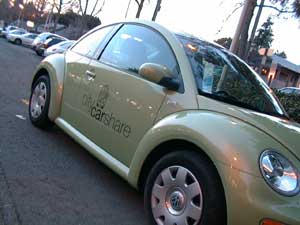Bay Area car-sharing program spurring travel changes
![]()
| 29 October 2003
| |  One of City CarShare’s finest steeds is captured in a rare motionless moment. The pioneering program, available at UC Berkeley and in a handful of other Bay Area neighborhoods, has proven effective at reducing its members’ reliance on private automobiles, according to a survey by Professor of City and Regional Planning Robert Cervero. Steve McConnell photo |
The Bay Area’s City CarShare, a nonprofit car-sharing organization, is showing measurable impacts in reducing vehicular travel, individual transportation costs, private car ownership, and environmental hazards, according to a new report by Robert Cervero, a professor of city and regional planning with the Institute of Urban and Regional Development. The findings are the latest in his three-year evaluation of City CarShare’s effects on travel, car ownership, the environment, parking, and the quality of life in various neighborhoods.
When car-sharing programs first began, positive social, economic, and environmental effects were touted as potential outcomes. Cervero’s study, financed by the Federal Highway Administration’s Value Pricing Program, shows that many hoped-for benefits have occurred.
Broadening the base
“At the start, CarShare members were drawn mostly from the ranks of environmentalists and avid cyclists,” Cervero says. “Over time, the program has attracted a more mainstream clientele. Because of economic benefits realized by users of City CarShare, it is gaining a loyal following.”
Cervero based his research on City CarShare reservation and use records, as well as travel-diary surveys of CarShare users, and analyses of personal, household, and car-ownership information. Surveys also were conducted with a statistical control group. Among his findings:
• since joining, 30 percent of CarShare households have sold one or more of their privately owned cars;
• some 67 percent of the CarShare members have chosen not to purchase an additional car;
• most trips taken by CarShare members were made outside of peak travel hours;
• shopping is the most common purpose for a CarShare trip;
• in San Francisco, 84 percent of the cases surveyed indicate that car sharing was less costly than renting cars or taking taxis;
• overall per-capita automobile travel among City CarShare members has dropped 47 percent, while use of such environmentally friendly transport modes as public transit, walking, and bicycling has increased;
• City CarShare is saving 13,000 miles of vehicle travel, 720 gallons of gasoline, and 20,000 pounds of carbon-dioxide emissions each day.
“Collectively, these results suggest that car sharing helps to shrink the urban transport sector’s ecological footprint in cities like San Francisco,” Cervero says in his report.
Members of City CarShare, who live throughout the Bay Area, pay a $300 deposit, a $30 application fee, and a $10-a-month administrative fee. They are free to reserve a car in City CarShare’s fleet, paying $4 an hour and 45 cents per mile, including gasoline. There is a $2 charge for use during off-peak hours (10 p.m.-8 a.m.). Member fees cover maintenance, insurance, and gas. Cars are kept in designated lots and returned to one of those lots after use.
City CarShare operates in San Francisco, Berkeley, Oakland, and Palo Alto, and on the UC Berkeley campus. Information is available at www.citycarshare.org.

